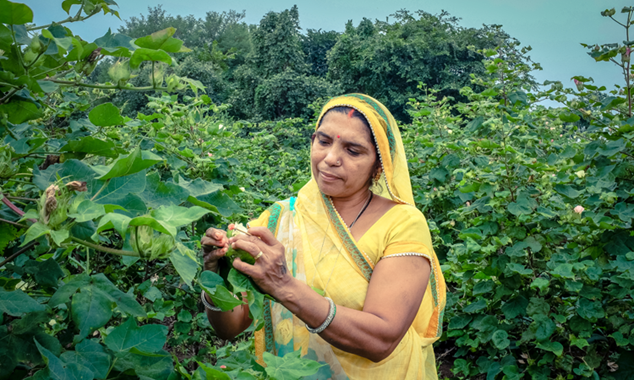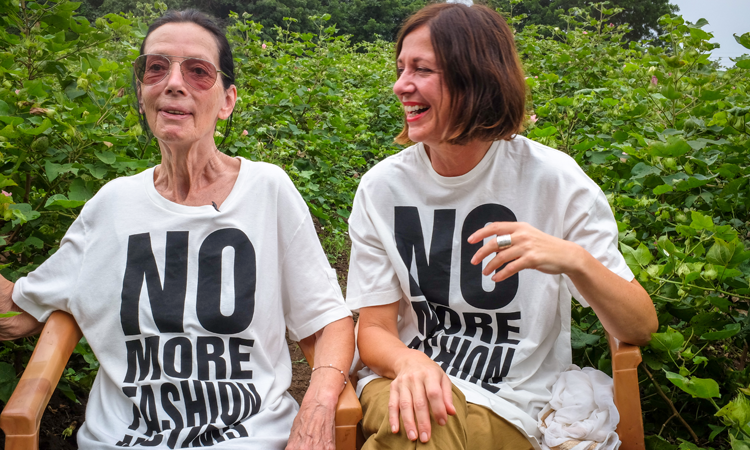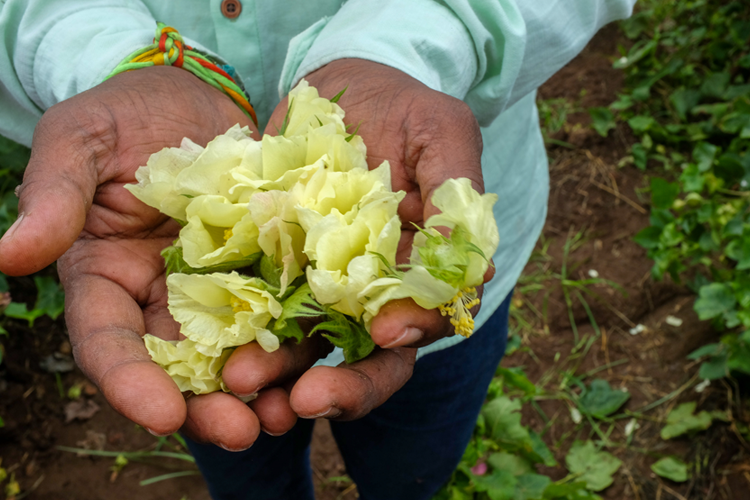To mark the 50th anniversary of Earth Day, the Fairtrade Foundation has announced today that it has launched a three-year programme in India to grow non-GM cotton seeds, benefitting the environment, farmer’s health and commanding a higher price.
Nearly two thirds of all cotton grown worldwide is now GM (genetically modified), which means that it is difficult for farmers to have access to non-GM seed varieties, which must be used to grow Fairtrade and organic cotton.
Fairtrade is working in partnership with Pratibha Syntex, a sustainability-oriented, vertically-integrated manufacturer of knitted textile to pioneer the seeds, and the project is funded by TRAID.
The objective is to develop new non-GM hybrids that have the exact cotton fibre parameters that the fashion and textile industry needs. The resulting seeds will be commercially produced and made available to farmers, allowing them to have more choice over how they farm.
The breeding programme is led by a professional seed breeder and has already produced some strong results following the initial pilot phase, when around 1,500 cotton farmers were given access to 9,200 organic seed packets produced by their own co-operative. The second phase of the project will see the development of new parent lines.
Several seasons on and the farmers have produced their own packaged seeds for sale which have been developed with input from the project’s ‘star’ members who have trialled the seeds on their farms. The seeds are sold for Rs600 a packet, which is 30% cheaper than the equivalent packet of GM seeds costing Rs730 and has led to a 25% reduction in overall costs for farmers. The seeds have been bred to be pest resistant, drought tolerant and to grow plants that will be easy to harvest.

Subindu Garkhel, Senior Cotton and Textiles Lead at the Fairtrade Foundation said: ‘Our relationship with the Earth and the environment needs to be one of respect, as nature had always intended it to be. Without that, we cannot expect to have healthy soil and waterbodies. It is also important to future proof organic and Fairtrade cotton farmers, especially in these difficult times.
‘Having access to non-GM seeds will bring all the environmental and health benefits of growing organic cotton, plus a higher price, as the farmers can access the high-value Fairtrade markets with their cotton. By avoiding toxic pesticides, farmers avoid health problems and deaths common in non-organic cotton production. It also reduces their production costs.’
GM seeds that are available to farmers are bred for high-input agriculture which means farmers need to use expensive synthetic fertilisers, pesticides and irrigation. In India alone there is a 95% monopoly on the seed market, making it almost impossible for small-scale farmers who want to cultivate Fairtrade or organic cotton to source non-GM seeds.
Maria Chenoweth, TRAID’s Chief Executive said, ‘We are very proud to support the work of the Fairtrade Foundation to enable Indian cotton farmers to grow organic. Increasing organic cotton production makes a significant contribution to reducing the environmental impact of the fashion industry, while reducing the use of hazardous pesticides. In the not too distant future, we hope every day will be Earth Day.’

Katherine Hamnett, fashion designer and Maria Chenoweth, CEO at TRAID ,visiting a Fairtrade cotton farm
Fairtrade is a member of the Climate Coalition, and is working alongside other organisations to protect the people, places and life we love.
You can download images here. For more information and interviews contact martine.parry@fairtrade.org.uk, Tel: 07886 301486.
Notes to Editors
Fairtrade cotton was launched to put the spotlight on these farmers who are often left invisible, neglected and poor at the end of a long and complex cotton supply chain. Through tools like the Fairtrade Minimum Price and an additional Fairtrade Premium and stronger, more democratic organisations, Fairtrade has sought to provide these farmers with an alternative route to trade and higher, more stable incomes. Fairtrade helps businesses to source Fairtrade Cotton thus providing traceability of where their cotton comes from and also transparency within their supply chains. Businesses can source Fairtrade cotton in two ways: the classic Fairtrade certified cotton model and the Fairtrade Sourced Cotton (mass balance model).
Fairtrade Sourced Cotton
This model makes it easier for businesses to source some of their cotton on Fairtrade terms. This way, farmers can sell more of their cotton, which means more benefits for them and their communities.
The Fairtrade Textile Standard
The Fairtrade Textile Standard is one component of the greater Fairtrade Textile Programme to facilitate change in textile supply chains and related business practices. This comprehensive approach engages manufacturers and workers in the supply chain to bring about better wages and working conditions, and engages brands to commit to fair terms of trade.
This standard applies to operators employing hired workers in the textile supply chain processing Fairtrade certified cotton and/or other responsible fibres. This includes, but is not restricted to ginners, spinning, weaving, knitting, and cut-make-trim stages of textile production. This standard is applicable in countries and regions where freedom of association is possible. Non-essential elements and accessories are not included in the scope of this standard.
This standard also applies to brand owners purchasing finished textiles. The brand owner must have a contract with the relevant national Fairtrade organisation or Fairtrade International.
About TRAID
TRAID is a UK charity working to tackle and solve the problems caused by producing, consuming and wasting clothes. Sourcing more of our clothes second-hand is the core of its work. TRAID provides the public with reuse services including clothes banks, free home collections and charity shops while educating for sustainability to empower people to become agents of change. Funds raised by reusing clothes are committed to global projects to establish more sustainable production and safer fairer conditions for people working in the supply chains making our clothes – from supporting organic cotton production to stopping child and bonded labour. TRAID’s vision is a world in which the clothes we make, and wear, do no harm to people or our living planet.
